One Man’s Burden, Hurricane Hugo hit Sullivan’s Island
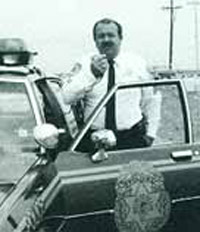 If ever Sullivan’s Island Police Sgt. David J. Price could erase a period of his life, he would most certainly eliminate the last two weeks of September and the first two weeks of October, 1989.
If ever Sullivan’s Island Police Sgt. David J. Price could erase a period of his life, he would most certainly eliminate the last two weeks of September and the first two weeks of October, 1989.
During those four weeks, Price lost 99 percent of his worldly possessions, protected a devastated jurisdiction, shared the grief and sorrow of his fellow Islander’s losses, and worried about the well being of his estranged wife and three children who live in the San Francisco Bay area.
Another man would have said, “Enough is enough.” Price didn’t. He just went about his business.
“I’m not hunting for any glory,” he said during a routine patrol of Sullivan’s Island. I’m just an ordinary person who, like many others, lost everything during the hurricane.
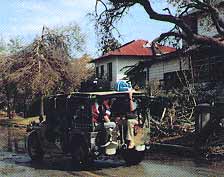 The destructive powers of Hurricane Hugo, which struck the Charleston area on the night of September 21, were initially underrated by many locals, including Price.
The destructive powers of Hurricane Hugo, which struck the Charleston area on the night of September 21, were initially underrated by many locals, including Price.
“This was my second hurricane. I rode one out when I lived in Hawaii back in ’79, but it wasn’t as powerful as Hugo. I underestimated what it would do, but I guess we all did.” he said matter-of-factly.
The son of a Georgian minister, Price has lived in a number of states throughout the country. He came to the Sullivan’s Island Police Department after a two-year stint with the Estill Department. A member of Sullivan’s Island force for four years, Price is the only one (of the five officers) who lives on the island.
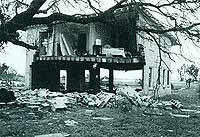 “We had a hurricane tracking map on the office wall, and we didn’t use it for show. We had been pinpointing it (Hugo), and followed it closely on the news. But on Wednesday (Sept. 20) we got the word from the Emergency Preparedness officials to evacuate the island.
“We had a hurricane tracking map on the office wall, and we didn’t use it for show. We had been pinpointing it (Hugo), and followed it closely on the news. But on Wednesday (Sept. 20) we got the word from the Emergency Preparedness officials to evacuate the island.
“My immediate thoughts were of long traffic lines, the people who had been here for so many years and would be forced to evacuate, and those folks who couldn’t leave. I knew we would have problems.
“We then went through the streets and used the loudspeakers to say: Mandatory evacuation; leave immediately. I must have said that a million times.
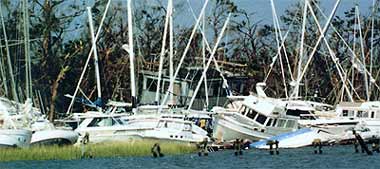
“There were several senior citizens I knew that could not get off the island by themselves, so I went and helped them move to the Moultrie Middle School shelter. I was really concerned about getting them to safety.”
Thursday morning, Price and his fellow officers were positioned by the Ben Sawyer Bridge, informing travelers that they would not be allowed on the island. He later patrolled the area and convinced local surfers to depart the Station 22 beach, which was enjoying Hugo’s lone 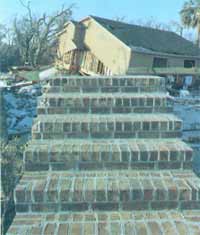 benefit – great waves for surfing. During his rounds, Price occasionally stopped by his apartment on Station 20 to pack several things into the trunk of his police car. He knew he wouldn’t be spending the night in the comfort of his home.
benefit – great waves for surfing. During his rounds, Price occasionally stopped by his apartment on Station 20 to pack several things into the trunk of his police car. He knew he wouldn’t be spending the night in the comfort of his home.
“We had plans to stay in the police station as long as possible (Thursday night) and then move into the I’ On Avenue bunkers. When the chief (Jack Lillienthal) and I saw the wind lift a truck , and then heard there was the possibility of a 30-foot surge, we left for Mt. Pleasant. By midnight, we were on the causeway after crossing a shaking bridge, but we couldn’t see in front of us. It was hard to keep the vehicle on the road. Chief made us wear life-vests before we left the island, and at first I thought it was silly, but I was glad we did. It was a great decision.”
Price eventually stayed with friends in Mt. Pleasant but recalled that he still couldn’t relax. The ripping sound of the wind, the cracking of trees, and the scratching of the roof shingles kept him wide awake, and he later went outside during the calm of the hurricane’s eye. He could see stars, but quickly returned inside when the wind began to pick back up.
“It’s just a job. I didn’t do anything heroic,” he said of his days following the hurricane. I just did what I was suppose to do, nothing special.”
Although it was still dark, Price, who was unable to sleep, made an attempt to return to the island. Boats, debris and fallen telephone poles blocked his path on the causeway, but he eventually got as far as Toller’s Cove. Price said he was “in a state of shock” when he witnessed the Ben Sawyer Bridge dangling in the Intra-coastal Waterway.
Several island officials were the first to take a volunteer boat to the island.
Chief and the fire chief were in the first boat and I’ll always remember them telling me, “You won’t believe this. It’s something.” I began to think of how long it would take for the island to recover, how the senior citizens would manage, and if most residents would pack up and leave.
“Late Friday afternoon, I went to look at my apartment. I was actually scared to open the door. My hand was shaking, and I couldn’t get my key in the door. I had to force the door to get it open. Then I saw it. I was dumbstruck. I saw everything turned over, mud everywhere. It was a hollow feeling to see all your possessions ruined. Things that I bought piece by piece. All of the rooms were trashed.
“I had a footlocker with photos of the kids and my paperwork in it. I walked over to it and hesitated before opening. After I lifted the top, and saw it was full of water, I began to cry. I literally bawled like a baby. It was bad enough to have lost my furniture, but to have lost those photos nearly killed me. I immediately left and couldn’t go back in there. I was glad to have my work to get my mind off what I had lost.”
Price was made responsible for helping to keep people off the island. Although there were no problems with looters, the police did have to contend with scavengers. Price exterminated four Copperhead snakes in one day, using “Old Betsy” (as he calls his pistol) and ran another one over with his car. He added that the National Guard did an excellent job, and assisted area law enforcement personnel. He was grateful for the Guard’s around-the-clock work.
By Tuesday, Sept. 26, officials began to allow residents to return to the island via ferry rides from a Shem Creek restaurant.
“I knew people would be frustrated, but many folks were cheerful and polite. I think they were genuinely happy to be back, and I’m sure many were hiding their actual fears. I just listened to them. Even if they complained, I just listened. Sometimes listening is the best medicine, and it was this time. In most cases, I could relate to what they were going through since I just went through it myself.”
Price came to grips with his personal losses and tried not to think about them. His new attitude was that the crying time was over and that you just have to go to work. He did.
“It’s just a job. I didn’t do anything heroic,” he said of his days following the hurricane. I just did what I was suppose to do, nothing special.”
During the weeks that followed Hugo, Sullivan’s Island began to slowly return to a state of “normalcy.” Then, on October 16, Price, like the rest of us, heard on the news of the earthquake in California. He feared for his wife and his three children (daughters of ages 23 and 13, and a son, 20).
“They’re okay, but it took me over an hour to get a hold of them. I was almost in a panic. When I finally got them, they were telling me what had happened, and I became speechless. I was almost ready to cry again, for I knew what they were going through.”
David Price, the policeman, is a hero for listening, being genuinely concerned, and simply doing his job. David Price, the survivor, has no choice but to take things day-by-day. Yet he sincerely wishes life came with an endless supply of erasures, so he could eliminate four long, hard and disastrous weeks.

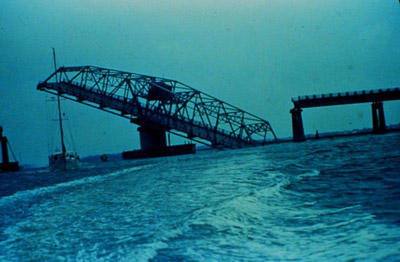 It was 8 a.m., Sept. 25, four days beyond Hugo. After an all night drive from Atlanta, my son’s evacuation home, I boarded the harbor-tour boat at Patriot’s Point for a return to the devastated Isle of Palms. In a pouring rain that added to the gloom, we were a rag-tag crowd gathered from all points of shelter.
It was 8 a.m., Sept. 25, four days beyond Hugo. After an all night drive from Atlanta, my son’s evacuation home, I boarded the harbor-tour boat at Patriot’s Point for a return to the devastated Isle of Palms. In a pouring rain that added to the gloom, we were a rag-tag crowd gathered from all points of shelter.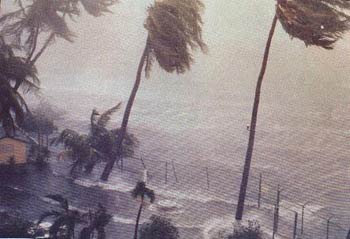 This was the first boat to the island, and the first time anyone had been able to get back since the storm drove us away. To add another war-like dimension to the incredible scene, we, in effect, had to give our name, rank and serial number before boarding the boat. You had to have the proper ID to prove your right to take the “Isle of Palms Clipper.”
This was the first boat to the island, and the first time anyone had been able to get back since the storm drove us away. To add another war-like dimension to the incredible scene, we, in effect, had to give our name, rank and serial number before boarding the boat. You had to have the proper ID to prove your right to take the “Isle of Palms Clipper.”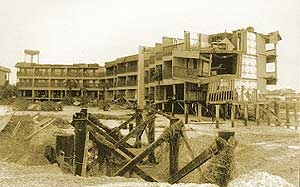 My thoughts were strange. Why did this Biblical phrase flash through my mind: “Many are called, but few are chosen?”
My thoughts were strange. Why did this Biblical phrase flash through my mind: “Many are called, but few are chosen?”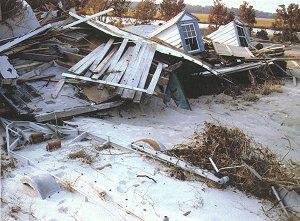 “We made it Evangeline. The worst is over.” These were the words that Thomas Williams spoke to his wife as he looked out the back door of his McClellanville home during the calm of Hugo’s eye. The view before him was pretty bad but it wasn’t devastating. For the most part, his house and the houses of his friends and relatives on DuPre street were in good shape.
“We made it Evangeline. The worst is over.” These were the words that Thomas Williams spoke to his wife as he looked out the back door of his McClellanville home during the calm of Hugo’s eye. The view before him was pretty bad but it wasn’t devastating. For the most part, his house and the houses of his friends and relatives on DuPre street were in good shape.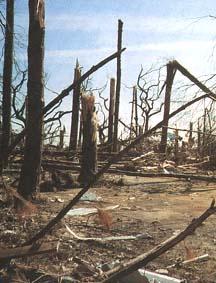 “I heard a cracking noise from the back of the house and saw part of the roof come off. I didn’t want the clothes in the back bedroom to get wet so I immediately started over there. As I walked down the hallway I could feel the carpet rising up around my feet. At first I thought that the wind was blowing so strongly it was lifting the carpet. Then I saw the water coming up through the floor and I knew we were in trouble.”
“I heard a cracking noise from the back of the house and saw part of the roof come off. I didn’t want the clothes in the back bedroom to get wet so I immediately started over there. As I walked down the hallway I could feel the carpet rising up around my feet. At first I thought that the wind was blowing so strongly it was lifting the carpet. Then I saw the water coming up through the floor and I knew we were in trouble.”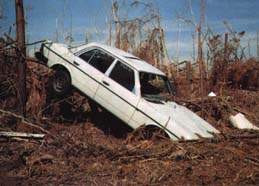 “I rushed everyone into the kid’s bedroom because there was a huge dresser in that room we could all stand on. That was when I decided to bust a hole in the ceiling to get into the attic. The ceiling in that room was sheet rock over plaster and I had a devil of a time busting through. I pounded and pounded, and just as I put a hole in the ceiling, the water lifted that dresser up like it was a cork. We were all tossed into the water which was about three feet high at the time. We fished everyone out and they seemed to be okay but at that point I didn’t know what to do. We had nothing to stand on and the water was rising fast.”
“I rushed everyone into the kid’s bedroom because there was a huge dresser in that room we could all stand on. That was when I decided to bust a hole in the ceiling to get into the attic. The ceiling in that room was sheet rock over plaster and I had a devil of a time busting through. I pounded and pounded, and just as I put a hole in the ceiling, the water lifted that dresser up like it was a cork. We were all tossed into the water which was about three feet high at the time. We fished everyone out and they seemed to be okay but at that point I didn’t know what to do. We had nothing to stand on and the water was rising fast.”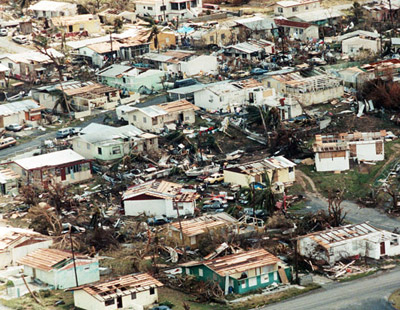 The point in time most vivid to one of them, Michael A. Pulliam, was acceptance of the belief that he would die. He and friend Kevin Williams were swept from a second floor of the house on the front beach and were propelled through twelve-foot white-water currents for a city block, landing finally on the roof of a one-story house. Sense of time was suspended, he says, the water, the wind and ink-black darkness were his only perceptions. “We didn’t scream,” he said. There wasn’t time.
The point in time most vivid to one of them, Michael A. Pulliam, was acceptance of the belief that he would die. He and friend Kevin Williams were swept from a second floor of the house on the front beach and were propelled through twelve-foot white-water currents for a city block, landing finally on the roof of a one-story house. Sense of time was suspended, he says, the water, the wind and ink-black darkness were his only perceptions. “We didn’t scream,” he said. There wasn’t time.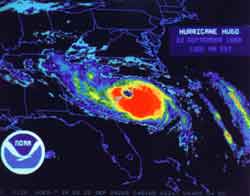 “It was half crazy, I guess,” Pulliam said. “But I really like the outdoors in bad weather. We didn’t want it (Hugo) to hit, but we were excited about the onslaught.”
“It was half crazy, I guess,” Pulliam said. “But I really like the outdoors in bad weather. We didn’t want it (Hugo) to hit, but we were excited about the onslaught.”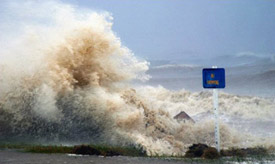 The two were in touch by phone with parents and friends in Columbia, who advised them of the progress of the storm. Pulliam’s mother called the Isle of Palms Police Department to report the presence of the two on the island,” Pulliam said. His grandfather called to instruct them to leave the house, a two-story brick construction, and go to the house next door, which is also two stories, but on stilts. “My grandfather was worried about the 12-18 ft. tidal surge predicted. He didn’t think the house would stand. There was nowhere for the water to go.”
The two were in touch by phone with parents and friends in Columbia, who advised them of the progress of the storm. Pulliam’s mother called the Isle of Palms Police Department to report the presence of the two on the island,” Pulliam said. His grandfather called to instruct them to leave the house, a two-story brick construction, and go to the house next door, which is also two stories, but on stilts. “My grandfather was worried about the 12-18 ft. tidal surge predicted. He didn’t think the house would stand. There was nowhere for the water to go.”